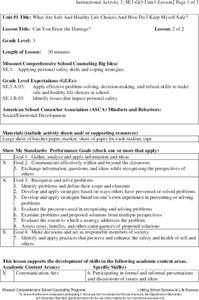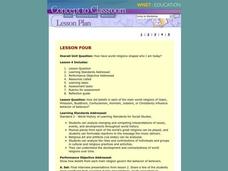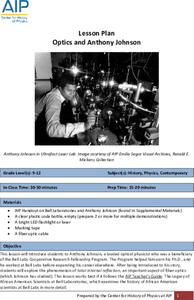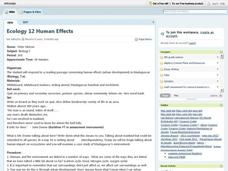Ontario
Reading Graphic Text
Do students really need to be taught how to read cartoons, comic books, and comic strips? Yes. Just as they need to learn how to read other forms of graphic text such as diagrams, photos, timetables, maps, charts, and tables. Young...
Missouri Department of Elementary
Can You Erase the Damage?
A pencil and an eraser bring forth the message that negative comments never truly disappear. On a large piece of paper, scholars list negative comments then attempt to replace them with kind ones. Pupils discuss the impact of negative...
Western Justice Center
Underlying Needs
Conflicts arise when underlying needs are unmet. An engaging video introduces viewers to nine basic human needs. Then, through a series of videos, worksheets, and activities, class members learn that by focusing on interests and needs,...
Curated OER
ESOL Telephone Communications
Students answer incoming telephone calls, take simple messages, and respond to voice mail prompts. They write a paragraph using correct spacing and legible cursive handwriting. They practice the sounds of past tense endings.
Curated OER
How have world religions shaped who I am today?
Young scholars analyze changing and competing interpretations of issues, events, and developments throughout world history. They analyze the roles and contributions of individuals and groups in cultural and religious practices and...
Curated OER
What Difference Does it Make How Old I Am?
Young scholars identify subtle messages advertisers send (often unintentionally) about age in the course of trying to sell products; to analyze the consequences, both positive and negative, those messages have on the American audience;...
American Institute of Physics
Optics and Anthony Johnson
Message sending has come a long way since the days of Morse code's dots and dashes. Young scientists study the research of optical physicist Anthony Johnson and his work in fiber optics, lasers, and the principle of total internal...
Franklin D. Roosevelt Presidential Library & Museum
The Power of Propaganda in Shaping Civic Actions and Understanding
Propaganda posters are powerful. Using images from The Art of War: American Poster Art 1941-1945 exhibit, young historians analyze the symbols, images, colors, and text used to rally support for World War II. Through seven activities,...
EngageNY
Connecting Ideas in Primary and Secondary Sources: What Led to the Attack on Pearl Harbor?
Let's make some sense of those thoughts! Scholars continue thinking about the different perspectives on Pearl Harbor. They analyze quotes from War in the Pacific, Day of Infamy, and Fourteen-Part Message. Readers tape each quote to chart...
EngageNY
Building Background Knowledge: The Pearl Harbor Attack: Unbroken, Pages 38–47
Perspective changes everything. Scholars use a close reading guide while analyzing pages 38-47 in Unbroken. Readers learn that the governments of Japan and the United States had very different perspectives about the attack on Pearl...
University of Virginia
Uncle Tom's Cabin: Reading the Novel
Teach the importance of context and perspective with a unit focused on Harriet Beecher Stowe's Uncle Tom's Cabin. The first lesson considers the role of female characters and readers, including the gender expectations of the time. The...
Reed Novel Studies
Walk Two Moons: Novel Study
Enjoy solving riddles? Perhaps Sal, a character in Walk Two Moons, is the only one capable of understanding a mysterious message left on her doorstep. On a road trip with her grandparent, Sal tries to make sense of the bizarre world...
EngageNY
Studying Conflicting Information: Varying Perspectives on the Pearl Harbor Attack, Part 2
Scholars take another look at Japan's Fourteen-Part Message. They then take turns adding ideas to sentence starters to create ideas about the different perspectives of government. To finish, groups mix and mingle to share their sentences...
PBS
Reading Adventure Pack: Oceans
Flotsam by David Wiesner and The Magic School Bus on the Ocean Floor by Joanna Cole, illustrated by Bruce Degen, begin a reading adventure pack focusing on oceans. With story listening and thoughtful discussion, scholars complete several...
Learning for Justice
Maya Angelou
Maya Angelou's poem, "Still I Rise", offers young scholars an opportunity to consider how poets use literary devices to create powerful messages. After a close reading and discussion of the poem, class members reflect on how they can...
Curated OER
Bible (Day 7) Redemption and Caretakers
Whether you are religious or not, humans can be caretakers of the Earth. Pupils will discuss recycling, how their wasteful actions effect the Earth, and the Alaskan oil spill. They then have small group discussion and write about how...
Southern Nevada Regional Professional Development Program
Focus: Spelling Common Words
If you’re going to get a tattoo, make sure your artist writes it right because it’s hard to correct their inkings. That’s the big idea in this short lesson on commonly misspelled words like their/there/they’re and it’s/its. Images and a...
Curated OER
I Hear Poetry
Students practice analysis of poetry by analyzing song lyrics using a worksheet to guide the analysis process. They work in small groups to assess the stylistic and literary devices used in the song lyrics then they find a published...
American English
Welcome to the Color Vowel Chart
Focus English language learners' attention on word stress and phrase stress with a pronunciation chart that breaks the sounds into moving and non-moving vowel sounds. The chart tool uses colors and key words to indicate where to put the...
Film English
If At First You Don't Succeed
When faced with a challenge, how do your pupils respond? Starting with character analyses, learners participate in a lesson about appearances and perseverance. They watch a short film, talk about common English expressions, and write a...
Curated OER
Gazing Into the Faces of AIDS
Students consider whether or not there are generalizations that can be made about people who are infected with H.I.V. or who have the AIDS virus. They create public service ad campaigns to educate the public and consider other ways to...
Curated OER
Rivers Through Time
Students read or have the book A River Ran Wild read to them. They discuss and reflect on the messages presented in the book. Students use their listening comprehension skills to draw conclusions. Students articulate several examples of...
Curated OER
Ecology 12 Human Effects
Students are able to respond to a reading passage concerning human effects (under development) in Madagascar. They have a quiz on primary and secondary succesion as their bell ringer. Students write an essay on the topic "No man is an...
Curated OER
CDs: Creating Direction
Students articulate a direction about prejudice through text and images via a CD album cover. In this prejudice instructional activity, students view images for prejudice from various sources. Students brainstorm words that contribute to...

























